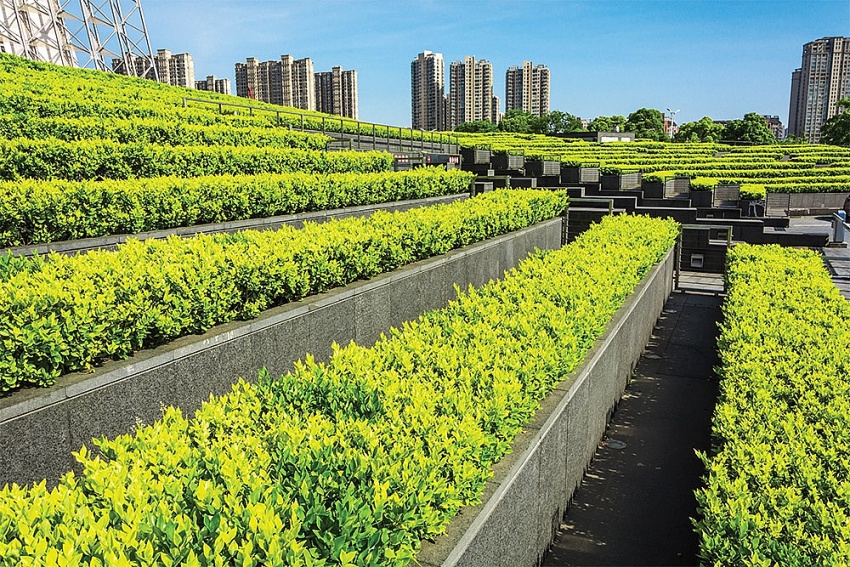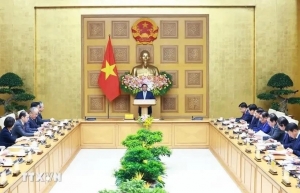FDI focus for twin transition intensifies
Writing for Singapore Business Review last week, partner Chris Malone and project manager Quan Doan from Dalberg Advisors highlighted that Vietnam’s growth trajectory is set to continue, bolstered by the digital and green trends that offer substantial economic opportunities.
“Following the long-term shift in manufacturing away from China, the nascent green energy transition is in its early phase, marking a critical pivot towards sustainable development,” they wrote. “In addition, the advent of economic restructuring driven by AI presents a new and exciting frontier, one where Vietnam is just beginning its journey.”
While still in its early stages of development in areas such as AI, Vietnam is making significant strides under its National Digital Transformation Programme towards 2030.
“Plans are in place to establish national centres for big data, supercomputing, and AI innovation aimed at attracting startups and foreign direct investment (FDI). This strategic initiative has already yielded results, with Oxford Insights reporting that Vietnam climbed to the 39th rank in AI readiness in 2023, up from 55th in 2022,” Malone and Doan noted.
In recent months, the nation’s leaders have built on these shifts by expressing desire to entice more FDI from neighbours like China, as well as regions such as Scandinavia.
 |
| FDI focus for twin transition intensifies, illustration photo/ Source: Shutterstock |
For example, Deputy Prime Minister Tran Luu Quang in March told Scandinavian businesses visiting Hanoi that priority will be given to ventures in green finance, high-tech industries, and electronics.
The same month in Beijing, Minister of Planning and Investment Nguyen Chi Dung and Chinese Minister of Commerce Wang Wentao agreed that both sides would further boost investment and connectivity in emerging fields such as green development, renewable energy, and the digital economy. The scope of this cooperation includes not only investment but also tech transfer, employee training, and the exploration of other markets, they said.
Sandeep Roy, founder and CEO of innovation consultants Innovate2Grow, said that these types of cooperation are crucial for Vietnam to move forward efficiently in both digital transformation and green growth.
“On the broader question of attracting more FDI in digital transformation and green growth to Vietnam, the government may consider some policies and initiatives that are aimed at creating a favourable funding climate, and it is essential to strike a balance between promoting investment and ensuring sustainability for long-term benefits,” Roy said.
The policies he suggested included, among others, a clear regulatory framework, funding incentives, digital skills development, intellectual property protection, support for startups and smaller businesses, and extended trade facilitation.
In terms of enterprises already with a foothold in the country, according to an annual report on digital transformation launched last month by the Ministry of Planning and Investment and the German Development Agency, there has been a significant improvement in the scores evaluating business readiness for such a transition, which rose by 0.7-1.4 points over the standard threshold of 2.5 points.
Businesses have understood the significance of digital transformation, with many proactively integrating relevant targets into their development strategy as well as mobilising necessary resources for digital transformation projects, the report revealed.
Regarding the green strand of the dual transition, according to findings in a March survey from Decision Lab, almost 80 per cent of the near-700 foreign business leaders surveyed are already approaching environmental, social, and governance (ESG) matters, even though a significant portion is in the early stages.
As indicated in the survey, market-based mechanisms are yet to make a positive impact on foreign businesses’ ESG initiatives. “Establishing these mechanisms, as well as improving access to green finance and current infrastructure, as well as the maturity of supply chain components, would greatly benefit foreign business implementation of environmental initiatives,” the report stated.
Eslam A. Hassanein, an assistant lecturer at the Faculty of Politics and Economics at Egypt’s Beni Suef University, explained that digitalisation offers a huge opportunity to accelerate the green transition, but fully leveraging the potential requires policymaking that acknowledges and mitigates the tensions that arise from twinning the two transitions.
Writing for policy research site Alternative Policy Solutions last year, while Hassanein outlined the negative conflicts in going both green and digital, for example in e-waste, lack of internet access, and various climate hazards, she also pointed out the positive interactions.
“The ICT sector can go green, for example, by promoting energy efficiency in data centres and cloud infrastructure, and by meeting electricity needs with renewables. Meanwhile, digital technologies have the potential to cut global emissions by a fifth by 2030, increasing efficiency, according to the World Economic Forum,” Hassanein wrote.
In a similar vein, a World Bank report on the green-digital transformation published at the end of last year noted that digital technologies are critical to accelerating climate action, particularly in reducing emissions in the energy and transportation sectors.
“Two-thirds of developing countries have already included technology in their climate action strategies, but the digital sector needs to be greener and more resilient,” the report said. “As countries increase their reliance on digital infrastructure, making these foundations climate-proof is vital to preventing weather-related economic fallout. Industry must also improve energy efficiency and use more renewable energy inputs for digital operations.”
The next step is bringing digital and climate goals together by integrating climate considerations into digital policies, sustainably addressing the digital divide, and strategically incorporating digital tech into climate change strategies, it added.
On May 16, Vietnam Investment Review will host a talk show called “Enticing FDI for the Dual Transformation”, the first in a series on new-gen FDI, which seeks to delve into how Vietnam can pull in more FDI for the green-digital transition.
The aforementioned National Digital Transformation Programme for the decade includes the target of overhauling Vietnam with a digital government, digital economy, and digital society.
Meanwhile, Vietnam’s National Green Growth Strategy towards 2030 is supported by a national action plan, approved in 2022. An accompanying circular broke down the strategy into four key goals: greenhouse gas emissions reduction; green economic reforms by sector; urban development and sustainable consumption; and equality, inclusion, and resilience.
| Tran Xuan Duong - Vice Chairman, Ha Nam People’s Committee
To implement green growth targets, Ha Nam is interested in both economic development and environmental sustainability. Therefore, in selecting investors, Ha Nam chooses those with advanced and environmentally friendly technology, mainly from South Korea, Japan, and Europe. To promote development in the province, we are shifting from brown to green. Production in this area is mainly stone production, so we are looking for solutions to minimise environmental impact. More importantly, we are building a chain of production activities for businesses to apply environmental treatment technology. We have been operating a factory which collects industrial waste and household waste to send to the incinerator, ensuring all waste in the environment is eliminated. Gabor Fluit - Former chairman, European Chamber of Commerce in Vietnam
Mirroring supply chain diversification and sustainability prioritisation strategies, many foreign retailers have selected Vietnam as a strategic global supply chain hub. Since the EU-Vietnam Free Trade Agreement was introduced, EU investors have committed over $26 billion into nearly 2,250 Vietnamese projects. Lego Group, for instance, received approval to invest over $1 billion in a carbon-neutral Vietnamese factory, while Adidas has over 50 local suppliers with more than 190,000 employees – epitomising surging EU corporate presence as economies integrate. Our Business Confidence Index survey confirmed this uptrend, with 31 per cent of members ranking Vietnam among their top three global investment destinations and over half planning investment boosts here – especially in high-tech manufacturing. However, Vietnam still faces barriers in aligning with the EU’s green supply chain focus, including enforcing more stringent environmental standards and regulations. Additionally, green technology adoption necessitates immense investments, while ensuring transparent, sustainable sourcing from local suppliers can prove challenging. Bruno Jaspaert - CEO, DEEP C Industrial Zones
Vietnam is at an important stage in its development process. I believe that a green future with a foundation of long-term sustainable development is the right direction. The initiative to establish an eco-industrial park is a good start, where Vietnam can evaluate investors in various standards. So, they come to Vietnam not only for economic benefits and job creation, but also to commit to protecting the environment and making a difference. If Vietnam incorporates these standards into its legal framework, it will play a key role in the new wave of sustainable development. The greening process in industrial parks in Vietnam is struggling with numerous challenges, so the government is building an appropriate legal framework. In particular, there are no incentives or recognition for businesses making a breakthrough in green transformation and sustainable development, which they are doing mainly based on the belief in future prospects. Currently, investors have some questions and when making decisions for investment in Vietnam, like what is the country doing for sustainable development? Is there any green credit system? How is the provision of carbon credits going? What will the transition to green energy look like in the next 10 years? Unless these questions are answered, it will be difficult to lure strategic investors. If Vietnam wants to turn FDI into a powerful tool for sustainable development, it needs to change its way of ranking FDI mobilisation ability among provinces. These may include not only investment performance but also evaluating and measuring waste management, carbon emission treatment, and training for workers. |
 | Green economy, digital economy breakthrough of Vietnam-China ties: PM Prime Minister Pham Minh Chinh on May 14 expressed his belief that economic-investment-trade cooperation, especially in green economy and digital economy, will be a driver and a breakthrough of the Vietnam-China relationship. |
What the stars mean:
★ Poor ★ ★ Promising ★★★ Good ★★★★ Very good ★★★★★ Exceptional
Related Contents
Latest News
More News
- Vietnam, New Zealand seek level-up in ties (February 19, 2026 | 18:06)
- Untapped potential in relations with Indonesia (February 19, 2026 | 17:56)
- German strengths match Vietnamese aspirations (February 19, 2026 | 17:40)
- Kim Long Motor and AOJ Suzhou enter strategic partnership (February 16, 2026 | 13:27)
- Haiphong welcomes long-term Euro investment (February 16, 2026 | 11:31)
- VIFC in Ho Chi Minh City officially launches (February 12, 2026 | 09:00)
- Norfund invests $4 million in Vietnam plastics recycling (February 11, 2026 | 11:51)
- Marico buys 75 per cent of Vietnam skincare startup Skinetiq (February 10, 2026 | 14:44)
- SCIC general director meets with Oman Investment Authority (February 10, 2026 | 14:14)
- G42 and Vietnamese consortium to build national AI infrastructure (February 09, 2026 | 17:32)




 Tag:
Tag:




















 Mobile Version
Mobile Version